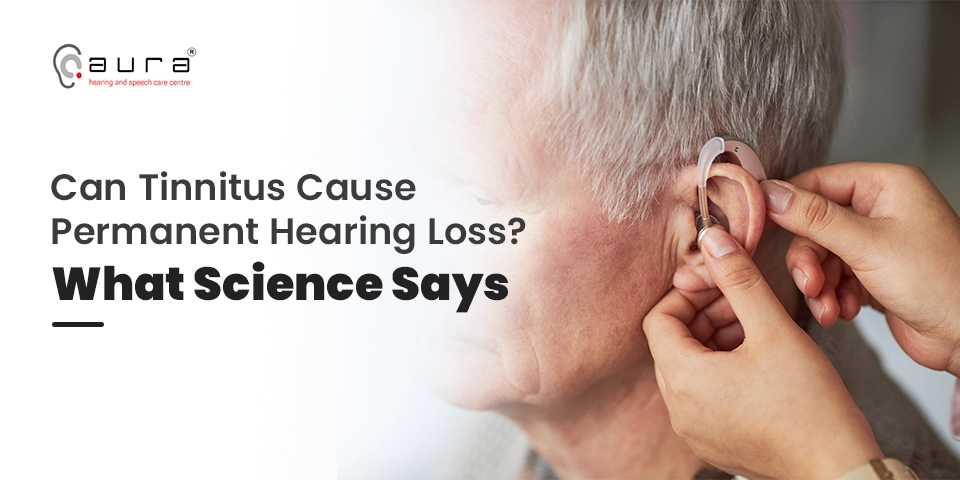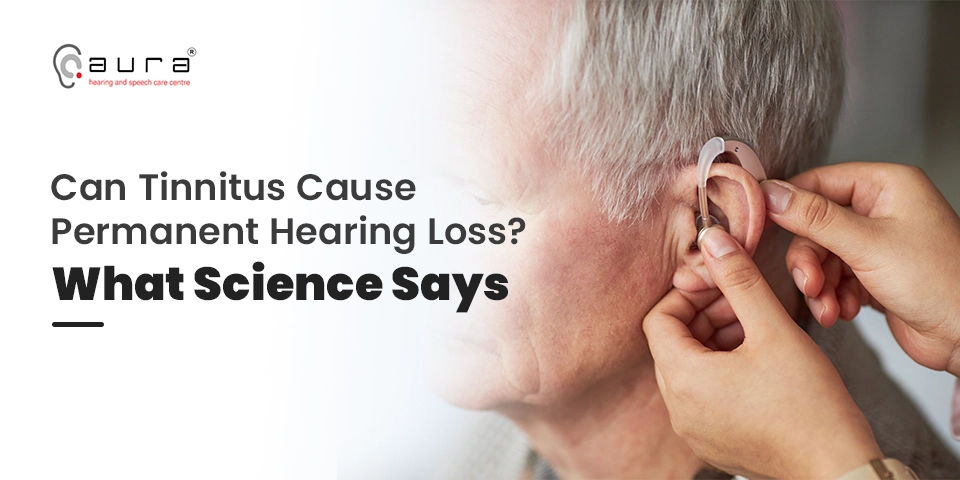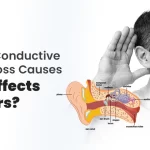
Tinnitus is a common auditory problem where a person experiences persistent ringing, buzzing, or hissing sounds in the ears. In clinical terms, it is a symptom that is caused by an underlying health condition. For example, it is associated with hearing loss, exposure to loud noises, ear infections, Meniere’s disease, and much more.
In this blog, we will understand the relation between tinnitus and hearing loss, how to manage this condition, and what science says about this condition.
Understanding the Relation:
It’s important to understand that tinnitus itself doesn’t directly damage the ears that are responsible for hearing. However, it frequently coexists with hearing loss, and often, they share underlying causes.
Many factors that damage the auditory system can lead to both tinnitus and hearing loss. These include:
- Noise-induced hearing loss: Exposure to loud noises, whether from concerts, machinery, or firearms, damages the delicate hair cells in the cochlea, leading to both hearing loss and tinnitus.
- Hearing loss related to aging: As we age, the degeneration of the auditory nerve is common and can result in both declining hearing and tinnitus.
- Meniere’s disease: This inner ear disorder affects balance and hearing, often causing tinnitus, vertigo, and hearing loss.
- Medications: Medicines like Ototoxic can damage the inner ear, leading to both tinnitus and hearing loss as a side effect.
- Accidents: Trauma to the head or neck can affect the auditory system, potentially causing both conditions.
In all of the above cases, tinnitus is a symptom of the underlying hearing loss, not a cause.
Role of Auditory Nerve Degeneration:
While tinnitus itself doesn’t directly damage the ear, the underlying hearing loss can lead to auditory degeneration. When the brain doesn’t get sufficient auditory stimulation, it can undergo changes that further impact hearing function.
What the Science Says:
Harvard scientists have found that some people with tinnitus, even those with normal hearing tests, might have “hidden” hearing loss. This means their auditory nerve, which sends sound signals to the brain, is affected.
- This idea started with research on mice in 2009.
- A recent large study of about 300 people found that those with tinnitus had damage to their auditory nerves and increased brain activity.
- This increased brain activity might be the brain’s way of trying to compensate for the nerve damage, which could lead to the perception of tinnitus.
- Therefore, even if your hearing test is normal, you might still have nerve damage that causes tinnitus.
How to manage this condition:
If you’re experiencing tinnitus, it’s important to seek medical help from an audiologist or otolaryngologist. They may run some tests to:
- Evaluate your hearing and identify any underlying hearing loss.
- Identify the cause of your tinnitus.
- Advise appropriate management strategies, which may include hearing aids, sound therapy, or cognitive behavioral therapy (CBT).
Aura Hearing Care offers a range of advanced hearing aids, including:
- Receiver In Canal (RIC): The device is compact and hidden, good for people new to hearing aids.
- Completely in the Canal (CIC): It is designed to fit completely inside your ear canal.
- Invisible in Canal (IIC): This is a minimal device, almost totally hidden, with just a tiny part to help take it out.
- In the Canal (ITC): Fits partly in the ear canal, with a small portion showing.
- In the Ear (ITE): This is a personalized hearing aid, designed to fit the outer ear for comfort.
- Behind the Ear (BTE): This device is the most used type and is available in different sizes.
In conclusion, tinnitus doesn’t directly cause permanent hearing loss because it is a symptom. Addressing the underlying causes and seeking medical help is essential for managing both conditions and protecting your hearing health.
Looking for hearing aids? Aura Hearing Aid can help you find the right solution. Book your visit today!
1. Can tinnitus directly cause permanent hearing loss?
No, tinnitus itself does not directly damage the structures of the inner ear that are responsible for hearing. However, it often coexists with hearing loss because they share underlying causes.
2. What is the connection between tinnitus and hearing loss?
They often share common causes, such as noise-induced hearing loss, age-related hearing loss, and certain medical conditions. In many cases, tinnitus is a symptom of underlying hearing damage.
3. If my hearing test is normal, can I still have hearing damage related to tinnitus?
Yes, recent studies from Harvard Medical School suggest that some individuals with normal hearing tests can have “hidden” hearing loss, specifically damage to the auditory nerve, which can be associated with tinnitus.
4. What should I do if I experience tinnitus?
It’s important to consult an audiologist or ENT doctor. They can evaluate your hearing, identify the cause of your tinnitus, and recommend appropriate management strategies.
5. Does Aura Hearing Aid provide hearing aids for hearing loss?
Yes, if medicine doesn’t fix it, Aura Hearing Aid has hearing aid options to make sounds clear and improve your hearing.
6. How can I book a consultation with Aura Hearing Aid?
You can go to our website (Types of Hearing Aids | Find the Best Fit for Your Needs) or call us to make an appointment with our hearing experts.











